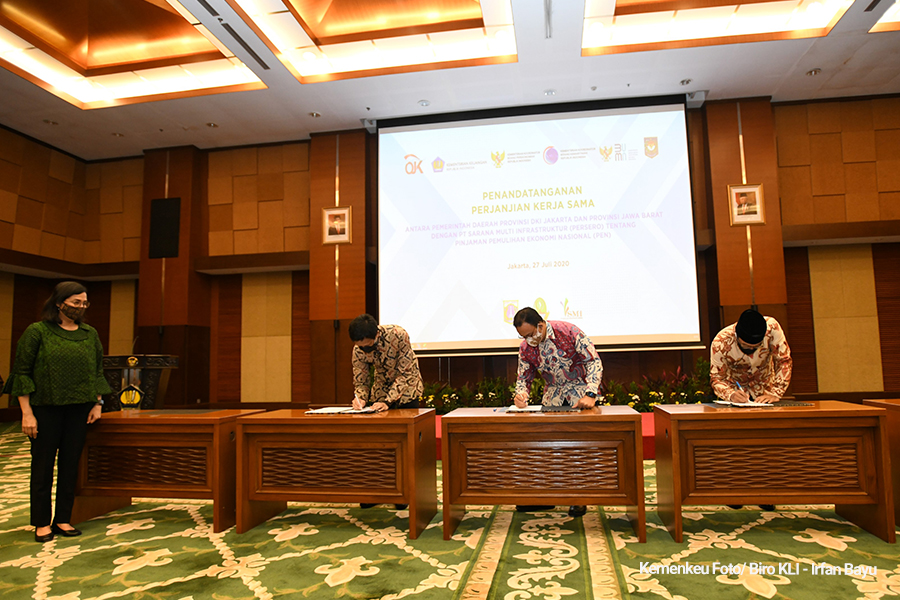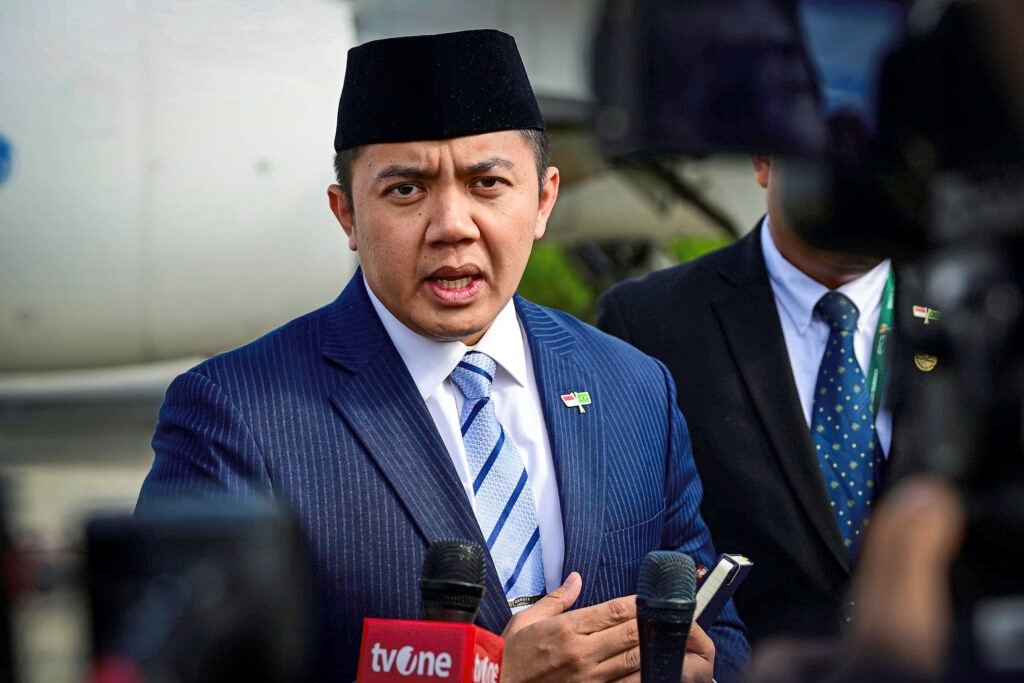Central, Regional Governments Cooperate to Recover Economy during Pandemic

Minister of Finance witnesses the signing of Agreement between Jakarta and West Java Provincial Governments with stated-owned infrastructure financing company PT Sarana Multi Infrastruktur (SMI) on National Economic Recovery Loan in Jakarta, Monday (27/7). (Photo by: Ministry of Finance)
The Government involved regional governments in the National Economic Recovery (PEN) program through several policies targeting wider public in order to recover Indonesia’s economy.
The most recent policy in the program is National Economic Recovery Loan for the regions and Deposit Facility in publicly listed Bank Pembangunan Daerah. The Government, in the 2020 State Budget has allocated Rp695.2 trillion in total. Of the total budget, Rp23.7 trillion has been allocated for Assistance to Regional Governments consisting of Additional Regional Incentive Fund for Economic Recovery amounting to Rp5 trillion, Special Allocation Funds (DAK) reserves amounting to Rp8.7 trillion, and National Economic Recovery Loan for Regional Governments amounting to Rp10 trillion.
“We and state-owned infrastructure financing company PT SMI and Directorate General of Fiscal Balance (DPJK) have conducted a study to COVID-19 pandemic worst-stricken regions such as East Java, Central Java, West Sumatra, South Sulawesi, Bali, North Sumatra that experienced significant decrease in the fields of tourism, trade, hotel, and restaurants. We want to enhance cooperation with the regional governments to recover their economy,” Minister of Finance Sri Mulyani Indrawati said during a signing ceremony of Agreement between Jakarta and West Java Provincial Governments with stated-owned infrastructure financing company PT Sarana Multi Infrastruktur on National Economic Recovery Loan in Jakarta, Monday (27/7).
National Economic Recovery Loan for the regions can be an alternative funding source for regions that, in particular, seriously affected by the pandemic so these regions can fund their priority expenditures. The loan is granted by Regional Governments in line with the purpose of the State Budget financing namely developing creative and innovative financing to support counter cyclical and national stability by prioritizing existing funding and financing schemes in the regions.
“What we have witnessed today is budget allocation to support regional governments. It is because regional governments must recover condition of the people and their economic activities without worsening the spread of COVID-19. It is indeed an extremely difficult task,” she said.
The Government to relax as well several regulations in the National Economic Recovery Loan, including low interest rate, long payback period of 10 years. In the implementation, the Regional PEN Loan will be managed by Directorate General of Fiscal Balance and carried out by PT SMI as the Ministry’s Special Mission Vehicle (SMV).
In addition to Rp10 trillion of budget allocated in the State Budget, PT SMI will provide regional governments with loan of Rp5 trillion to support National Economic Recovery program. This budget is an addition to the regular funding provided by PT SMI to the regions until 2020, and also not included in the National Economic Recovery program budget amounting to Rp15 trillion. To assist the initiative, the Government will provide interest subsidy to the loan granted by PT SMI so that the loan can be implemented in a fast and precise manner while still maintaining the governance.
Jakarta Province and West Java Province are the first regional governments that use the loan. The agreement is expected to accommodate Jakarta’s loan proposal of Rp12.5 trillion and West Java’s loan proposal of Rp4.5 trillion in the handling of COVID-19 and economic activities recovery. In Jakarta, the deficit is caused by a decline in the region’s locally generated income (PAD), as well as from budget re-allocation and refocusing for the handling of the pandemic. Through the loan, Jakarta Provincial Government proposed a loan of Rp4.5 trillion for 2020 and Rp8 trillion for 2021. The budget will be used to fund infrastructure projects which the implementation is hampered due to lack of budget, particularly drinking water facilities, flood control facilities, waste management facilities, as well as in the field of transportation, tourism, and sports.
In the meantime, Governor of Jakarta Anies Baswedan expressed his appreciation to the Minister of Finance and PT SMI for the signing of the agreement.
“I thank the Minister, Ministry of Finance officials, and PT SMI for initiating the loan. The loan will help the funding of a number of sectors such as improvement in flood control, drinking water service, waste management, transportation infrastructures, as well as infrastructures for tourism, culture, and sports. Jakarta plays a significant role in Indonesia’s economy since acceleration of economic recovery in Jakarta will impact the national economy,” the Governor said.
As for West Java Province, the regional government proposed a loan of Rp1.904 trillion for 2020 and Rp2.098 trillion for 2021. The budget will be used to fund several infrastructure development projects such as Social Infrastructure (hospitals, community health centers (Puskesmas), and other healthcare facilities); Logistics Infrastructure (roads/bridges that connect province, regencies or cities); Apartment Blocks for Low Income People (MBR); Spatial Planning Project of Special Zones (city square, tourist destination spots, creative centers), and Environment Infrastructure (irrigation and drainage).
“Allow me to thank the Minister of Finance along with her officials and PT SMI because today West Java received three assistance. First is regional loan, second is Viability Gap Fund for long-awaited project namely waste to energy project that must be implemented as a breakthrough in environmental and waste management in Indonesia. The third assistance is deposit facility in publicly listed Bank Pembangunan Daerah Jawa Barat dan Banten (Bank BJB) to recover the economy. The three instruments are expected to stimulate the economy in the last half year of 2020. Our study shows that the economy of West Java can range between minus 2 percent to 2.3 percent. We will do the utmost to achieve 2.3 percent. If the economy of West Java increases, it will affect nationally since population of West Java is quite large,” Governor of West Java Ridwan Kamil said.
On that occasion, the Government also signed a Memorandum of Understanding (MoU) on deposit facility in four publicly listed Bank Pembangunan Daerah, namely Bank DKI, Bank BJB, Bank Pembangunan Daerah Sulawesi Utara dan Gorontalo, and Bank Pembangunan Daerah Jawa Tengah. The signing is a follow-up of state money deposit program in banks member of the Association of State-owned Banks (Himbara).
Translated by : Rany Anjany
Reviewed by: Mia Medyana








